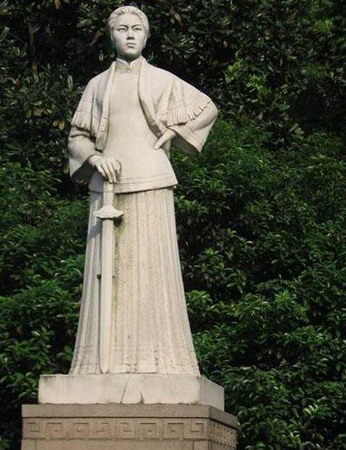Qiu Jin
Born in Minghou County, Fujian Province, Qiu Jin (1875-1907) had her family roots in Lizhu, Shanyin, Shaoxing. The Qius was a big family in Shanyin and had produced government officials for generations. With a passion for literature as well as for swords masters since her childhood, Qiu Jin was forthright and unrestrained like a man.

When she grew up, she learned martial arts from a cousin and learned to ride the horse. What she had learned contributed to her character. Despite her family’s opposition, she went to Japan to study. She entered a woman’s school in Tokyo. In collaboration with her comrades, she founded organizations and created a newspaper advocating the overthrow of the Qing government and championed the equality of women with men. She came home after protesting the rules issued by the Japanese government against the revolutionary activities of foreign students. After her return, Qiu Jin plotted with Chen Boping to stage an armed uprise against the Qing government. She created a newspaper called Chinese Women. In the early 1907 Qiu Jin replaced her predecessor as the principle of Shaoxing Datong Sports Teachers School. Though it was an establishment for cultivating sports teachers for primary education in name, the school actually was an organization to train military cadres for the revolutionary cause. From January to June of that year, Qiu Jin made secret plans together with Wang Jinfa, Zhuo Zhuoxian, teachers of the school. She also sent envoys to Zhuji, Shengxian, Xinchang, Yiwu, Jinhua, Lishui in Zhejiang Province to develop the anti-Qing forces. She also visited Hangzhou and Shanghai, setting up chapters of the Chinese Revolutionary League and absorbing members from the New Army in Zhejiang and two schools in Hangzhou.
Qiu Jin created an outline for the system of the Revolutionary Army. She organized a meeting at the White Clouds Nunnery in Hangzhou, seeing comrades from all over Zhejiang Province and officially setting up the Revolutionary Army. At the meeting, Xu Xilin was elected as chief for the army and Qiu Jin was his deputy. The participants at the meeting agreed to revolt in May 1907 in Zhejiang and Anhui provinces and then the united forces would attack Nanjing. However, Xu Xilin was betrayed by a traitor. Hastily, he started an armed revolt in Anqing, Anhui province on July 6. The uprising failed. On July 13, the Qing soldiers surrounded the Datong School and Qiu Jin was arrested. On July 15 she was executed at Xuantingkou, Shaoxing. She was 33 when she died. In 1908, her friends Wu Zhiying and Xu Zihua buried her remains at the Xiling Bridge on the West Lake in Hangzhou, a place Qiu had chosen for her burial. After the success of the 1911 Revolution, Sun Yat-sen wrote an inscription for Qiu Jin, singing of her as A Woman Hero. After the founding of the People’s Republic of China, Qiu Jin’s former residence in Shaoxing was turned into her memorial, a key cultural relic under the protection of the state government. The Monument to Martyr Qiu Jin is a cultural relic under the protection of the county government.
Source: travelchinaguide.com
Editor: Wang Moyan
|

